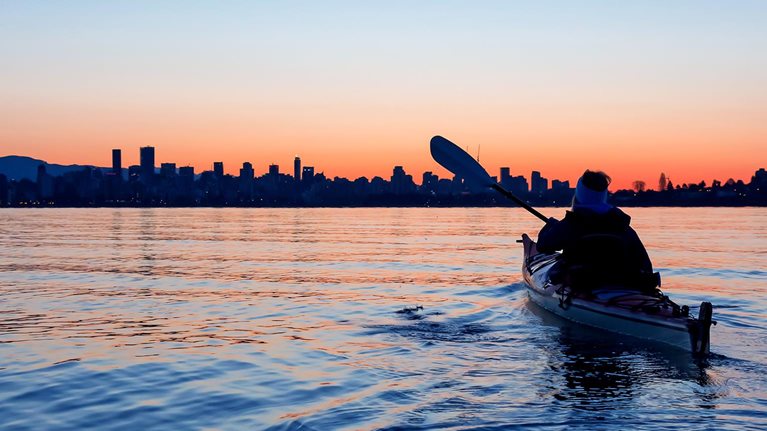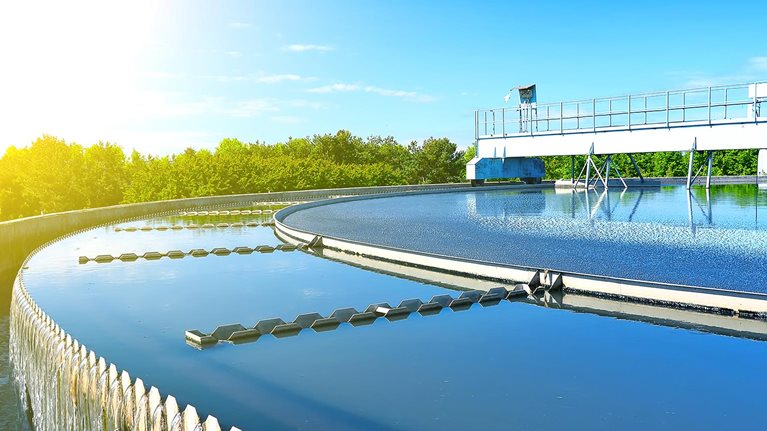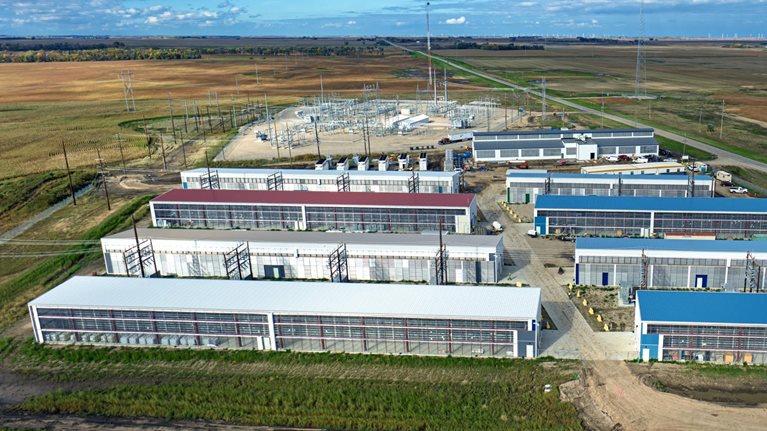Christophe Beck believes that water waste needs to become a thing of the past—and that growing a business goes hand in hand with solving the water crisis. Beck is chairman and CEO of Ecolab, which provides a wide range of water management and hygiene products and services (from disinfectants and cleaning supplies to water-treatment systems) to customers in more than 170 countries.
When it was founded in 1923, “Economics Laboratory” served the restaurant industry. Now known as Ecolab, the 48,000-person company serves 40 industries and has annual revenues of $16 billion. Recently, the company expanded its services to data centers, where, among its offerings, it provides chip-cooling solutions that minimize water use.
Beck, a citizen of both the United States and Switzerland, joined Ecolab in 2007 and became CEO in 2021. He spoke with McKinsey Senior Partner Thomas Hundertmark at Ecolab’s St. Paul, Minnesota, headquarters about managing the complexity of Ecolab’s business, establishing a culture of innovation, and how pursuing a diverse workforce has created high-performing teams. This interview has been edited for length and clarity.
McKinsey: Part of Ecolab’s mission is to “protect people and the resources vital to life,” and you have a particular focus on water. How is Ecolab addressing water scarcity?
Christophe Beck: I’m very passionate about this topic because without water there is no life, no business growth, no future. The very good news is no one is against clean water. Many topics in the world today are very polarizing. Water is not.
The problem is that the way we use water today is linear: We use water, and we dump water. That’s not going to work long term. If you were to bring all the water on Earth together in one bubble, that bubble would be a little over 800 miles wide. But here’s the catch: If you look at just the surface water, including lakes and streams, it would be a bubble that’s roughly 35 miles wide. That’s all we’ve got. And when we look down the road to 2030, the world will need 56 percent more than what nature can replenish through the rain cycle. We will need to reuse and recycle water.
We’ve made the commitment that by 2030, we’ll help our customers save enough water for the drinking needs of one billion people. Last year, we helped save enough water for over 780 million people.
A few years ago, we tried to understand the true impact of business on water usage. The striking fact was that 150 companies impact a third of the world’s water usage. This is very good news because you can get 150 companies in one room, and that’s what we’re doing with the Water Resilience Coalition. And more good news is that when you reduce water usage, you reduce energy usage because up to 75 percent of the energy used in a manufacturing plant is used to manage water, to heat water, to cool water, to treat water, to pump water—you name it. So you reduce water usage, you reduce energy usage, you reduce your cost as well.
McKinsey: Why do you think there hasn’t been more action taken on something so tangible? What’s your take on why some businesses aren’t making more of a difference?
Christophe Beck: The first challenge is an emotional one. Many of our customers think that working on water preservation, reuse, and recycling will come at a net cost. It’s a net cost they are not interested in taking on because of the misperception that water is a low-cost, infinite resource. But we know that is not the case. While water may be inexpensive, we cannot generate more of it. The good news is that for 100 years, Ecolab has been demonstrating that reducing net water usage is a smart, fiscally responsible business decision, even in the short term. It’s not about making a big investment where the payback is five years down the road.
The second, more rational hurdle is to understand what technologies and models we need to use in order to reuse and recycle water. What many people don’t realize is that technology already exists to solve this problem. We aren’t starting from scratch. We don’t have to innovate in the future to figure this out. We can do it today.
In the microelectronics field—the so-called fabs where they manufacture chips—one fab uses as much water as the drinking needs of roughly 17 million people. And those few fab companies around the world all have huge wastewater treatment plants. The way we need to think about it is that wastewater is an engineering flaw. There should be no wastewater. We should be reusing and recycling the water within the production process. If you do it step by step with the right technology, you can use almost no water to produce more chips—at a lower cost. So there’s an emotional and a technical hurdle. Both need to be addressed.
McKinsey: How does Ecolab execute on this mission?
Christophe Beck: Our strategy starts with our purpose of protecting what’s vital, protecting people from infection, protecting natural resources—especially water. The next step, by industry, is to define what that protection truly means. For a hotel, it’s to make sure that whatever the guests eat or touch and where they sleep, where they swim—all are safe. And it’s to do it at the lowest cost and using the least natural resources. It’s a very simple strategy that’s very hard to execute.
Most companies produce products, or solutions, or expertise, or digital technology. We bring it all together. When we help a hospital reduce infection, we need to touch everything in the hospital. We need to make sure that the medications are safe, that the operating room is a safe place, that the food is safe, that the laundry is done safely, and that the water is clean. Infection will come from the weakest link.
McKinsey: How do you manage the scope and the complexity of serving so many industries in so many locations?
Christophe Beck: There is good complexity and less good complexity—and we try to minimize, obviously, the latter. We start by making the same promise to all customers in any industry we serve: that we will help them do more with less.
Our model to serve those industries is also the same: expertise combined with chemistry and technology. We have the same cloud for all the industries. Our R&D is also central. But every end market for us has a dedicated business, a dedicated division, with dedicated expertise. The business units serving data centers are not the same as the ones serving a hospital or serving a paper mill.
McKinsey: Can you give me a specific example where managing good complexity has been difficult?
Christophe Beck: It’s really hard to have different experts work for the same customer in a harmonious way. When we talk about a hospital—where you’re managing the safety of the drugs, the operating room, the patient room, the food—those are different experts, with different expertise. On paper, it’s easy to say, “You just need to work together for the good of the customer.” In practice, it’s way harder. Those people need to know and trust each other. They need to understand that what they do is complementary, and it’s a one plus one equals three for the customer.
There’s a cultural component to this. It’s not an easy thing to do, and it is still a challenge. We’re a very competitive organization; every business wants to be better than the other one. But by evolving our culture and helping everyone understand that by working together it’s better for the customer at the end, everyone wins.
We had technological challenges as well, because every business came from different software platforms and had different data sets. We had to evolve toward one ERP [enterprise resource planning], one CRM [customer relationship management], one cloud, one data set. Those are difficult transformations, and we’re still on that journey.
McKinsey: Amid all of this complexity—and opportunity—what is your decision-making process? How do you decide how to allocate resources?
Christophe Beck: First, we ask every division—every end market, so for us that’s restaurants, hotels, hospitals, and so on—what’s the business opportunity from solving customer problems? What are the innovation opportunities for us and our customers? Our promise has always been that when we invest in what we do for customers, they get an even higher return.
Our second step is to categorize our businesses in four categories. Our first bucket—the “fuel” businesses—have the biggest growth potential, the biggest margin improvement potential. The second bucket—the “protect” businesses—are the core businesses that we’ve built over decades and that we need to protect. They can improve, but not as much as the fuel ones. The third one is what we call the “transformation” bucket. These businesses have the potential to be good, but they’re not good today. And then you have the fourth category: the “maximize” businesses. Those are the ones where we don’t know if we’re going to find a way to make them work, but we will try. We think about the resources we allocate to those business opportunities in terms of time, resources, head count, investment, and management attention.
McKinsey: One area you have chosen to invest in is AI data centers. What is the opportunity for Ecolab in this area?
Christophe Beck: We estimate that by 2030, AI will require the power equivalent of the whole of India and the drinking water needs of the whole of the United States. It’s going to be massive.
Saving the planet has fallen a little bit out of fashion in the last few months, but AI is something that everybody wants to embrace. Politicians, businesses, everybody wants to be part of that journey—with this big catch that we don’t have the power. But we can generate the power. We don’t have the water either, but we cannot generate the water; we need to reuse and recycle it. As a company, we refocused a lot of our R&D investments on data centers and on chips manufacturing because that’s going to make a big difference—not only in AI, but because we will do it in a way that uses less energy and water.
McKinsey: What are some technologies you are deploying with customers in that space?
Christophe Beck: One is a shift from the way data centers have been cooled for the last ten years. Up to a year ago, you had large computers in a room that you cool down through high-powered air-conditioning. Now, it’s shifting toward a new technology that’s called direct-to-chip cooling, which means you bring a cool liquid on the surface of the chip. This requires liquids going through very small tubes that need to be leak-free.
The technology we’re providing is threefold. First, it’s making sure that the fluid that’s being brought to the chip is in perfect condition. Second is the CDU, the coolant distribution unit, which distributes the fluid across all the chips in the data center. The third technology is to cool the coolant that’s being brought to the chip. And we integrate that whole solution for data center operators.
McKinsey: How are you using AI in your own operations?
Christophe Beck: It’s helping us bring the knowledge we have in the company to anywhere around the world. What does that mean? Today, we have 27,000 experts in 40 industries in 172 countries. We have individuals around the world who know best how to manage a hospital, a data center, a steel mill, or a brewery. But that knowledge of what is best-in-class quality, performance, and environmental impact is in the head of each of those 27,000 people.
Our idea is to leverage digital technology, AI, and gen AI to bring that knowledge of the 27,000 people to everyone’s fingertips. This would mean anyone in our company can be in front of the steel mill, or a data center, or a restaurant and know the performance of that unit. They can answer, “What’s the potential here versus the best in class that we have delivered somewhere in the world, and what’s the plan to get there?”
McKinsey: Incorporating AI into your operations and developing new services for data centers—these are changes born of innovation. How do you cultivate a culture of innovation at Ecolab?
Christophe Beck: The easiest way for us to strengthen our culture of innovation is to align the whole company behind our purpose: “protecting people and the resources vital to life” for all of the 40 end markets that we are serving.
The second element is accepting that we will fail. That’s not always been our strength as a company. First, we hate to fail. And second, we never quit. It’s important to quit when you see something is just a dead end. That’s been probably the hardest lesson. We had to break those two barriers. When our teams are really passionate about what we are trying to accomplish, and they feel that it’s OK to fail, suddenly, you unleash much more creativity and a much more entrepreneurial spirit.
McKinsey: Your company was recently recognized for your commitment to diversity, equity, and inclusion. How does this commitment serve Ecolab’s business?
Christophe Beck: Last year was our best-performing year in our history. At the same time, it was the year when we had the highest level of engagement and the highest level of diversity. This is not a coincidence. Since 1923, the unstated strategy that we’ve had has been to grow fast by growing our impact and growing our team. Growing our team means building high-performing teams that work together, accept different ideas, and come up with better solutions.
150 companies impact a third of the world’s water usage. This is very good news because you can get 150 companies in one room.
We’ve always had the ambition to align what our teams look like with what our customers and markets look like. We work every single year to make sure that we become the best place for the best talent wherever you come from, whatever your beliefs are. So when we get recognized for the way we welcome different people within our organization, it makes us proud, for sure. But it’s not what’s driving us. What’s driving us is to keep driving impact for our customers, and for our teams to see that they have a future and that they can keep growing.
McKinsey: Another commitment you have made is to sustainability. You mentioned previously that some companies are steering away from pursuing sustainability. Why is Ecolab staying the course?
Christophe Beck: The names have evolved over time. Sustainable development, sustainability, ESG [environmental, social, and governance], net zero. Unfortunately, it’s gotten misunderstood by some businesses, by consumers, by investors. We’ve realized collectively that consumers are not ready to pay more for greener, sustainable products. Investors are not ready to earn less with companies that are trying to do the right things the right way. That’s been a big “aha” over the last few years.
But this is not totally true, because Ecolab’s belief for 100 years is that producing better products with less impact on natural resources is good for business. That’s why our company was called Economics Laboratory in 1923 when we started. It was a business idea, not an ecological idea.
We’ve made clear commitments in terms of how much water we’ll help our customers save. We’ve made the commitment that by 2030, we’ll help our customers save enough water for the drinking needs of one billion people. Last year, we helped save enough water for over 780 million people.
McKinsey: What have you learned about yourself since becoming CEO?
Believe in the magic of the team, and they will give it back to you in spades.
Christophe Beck: The most important learning has been that I don’t always need to have the answers. Even if I don’t know what the solution is because things are changing too fast, or nobody knows how long the supply shortages are going to impact us, even if I don’t know how to solve those issues or capture those opportunities, my team does know. If your team is in a good place, feels supported, feels that they have a future, even if times are tough, they will come up with the right solution. As a company, we’ve experienced that in an extreme way over the last few years. It’s been my biggest learning: Believe in the magic of the team, and they will give it back to you in spades.

We are celebrating the 60th birthday of the McKinsey Quarterly with a yearlong campaign featuring four issues on major themes related to the future of business and society, as well as related interactives, collections from the magazine’s archives, and more. This article will appear in the fourth themed issue, which will launch in August. Sign up for the McKinsey Quarterly alert list to be notified as soon as other new Quarterly articles are published.


